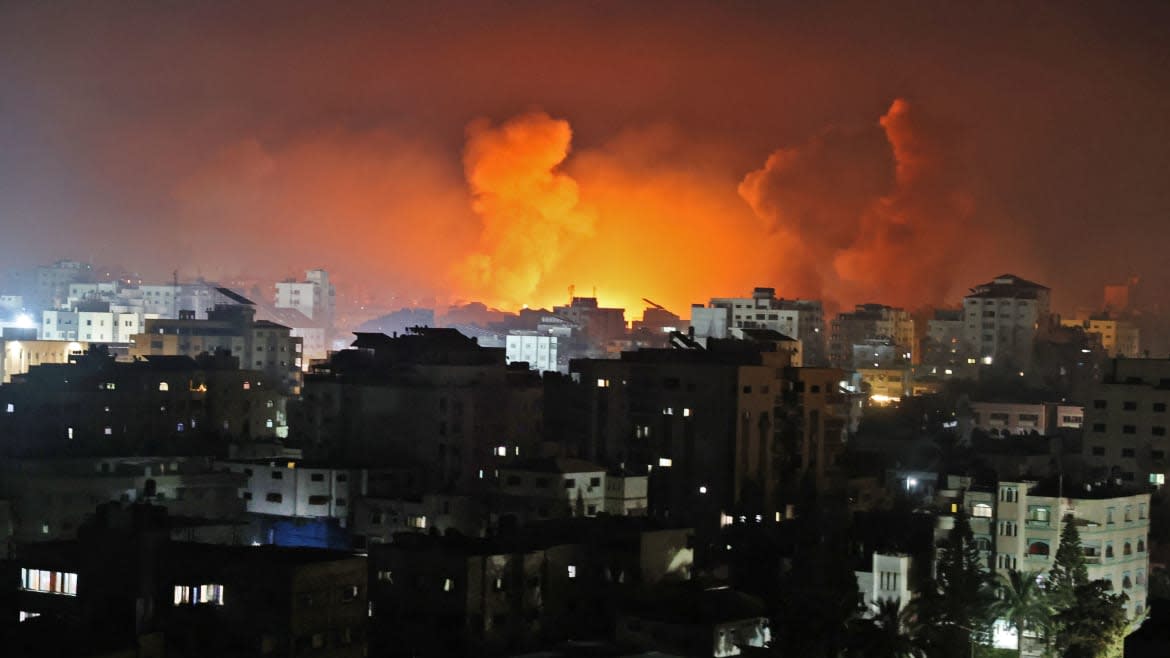Israel and Hamas Agree to Ceasefire After 11-Day Bloodbath

- Oops!Something went wrong.Please try again later.
After 11 devastating days of relentless airstrikes and rocket-fire attacks that killed over 200 Palestinians and 12 Israelis, Hamas and Israel have agreed to a ceasefire.
On Thursday, a truce was reached between Israeli officials and Gaza’s ruling Hamas group, set to commence at 2am. The move comes after mounting pressure from the international community, including from the Biden administration, urging de-escalation in a conflict that has been described as a humanitarian catastrophe.
“These hostilities have resulted in the tragic deaths of so many civilians, including children, and I send my sincere condolences to all the families, Israeli and Palestinian, who have lost love ones, and my hope is for a fully recovery for the wounded,” said U.S. President Joe Biden in a Thursday statement addressing the ceasefire. “I believe the Palestinians and Israelis, equally deserve to live safely and securely, and to enjoy equal measures of freedom, prosperity and democracy.”
The president also announced his administration’s plans to help replenish the Iron Dome defense system after reiterating Israel’s “right to defend to itself” against rocket fire attacks, and to work with international stakeholders and the Palestinian Authority—“not Hamas,” he emphasized—to help with Gaza’s reconstruction efforts.
The latest quasi-war—which sent shockwaves throughout the Holy Land and reverberated across the world—has proven to be the deadliest in the region since 2014.
In Gaza, now in ruins, entire families were wiped out by Israeli airstrikes—buried under the rubble of their homes. Among the casualties are dozens of children and women, as well as diligent journalists and treasured medical professionals who were indispensable to the besieged and under-resourced enclave, already hard-hit by the global pandemic.
Netanyahu Vows to Keep Bombing ‘Full Force’ After Horror Day for Palestinians
The barrage of strikes that rained down on Gaza demolished houses, shops, and multiple high-rise buildings, including one that housed the offices of the Associated Press. One Gaza father lost four children in a matter of seconds after his home was hit. “My darling, my darling, thank God, thank God,” he can be heard saying in a video showing him reuniting with his sole surviving child, a six-month-old infant.
The youngest casualty on the Israeli side is 5-year-old Ido Avigal, who was killed after a Hamas rocket—one of hundreds launched into Israel—bypassed the Iron Dome and landed in the town of Sderot. “I’m sorry I did not take the shrapnel in your place,” his mother reportedly said at his funeral.
What started as localized resistance to the forced eviction of Palestinians from their homes in East Jerusalem—and the removal of Muslim worshippers from Al-Aqsa Mosque during a violent raid by Israeli forces—soon exploded long-simmering tensions that have persisted in the region for over half a century.
Around the world, protests drew hundreds of thousands of people demanding an end to Israel’s seemingly ever-growing settlements, its occupation of Gaza and the West Bank, and its structural discrimination against Arabs in what has been blasted as an apartheid system.
Journalist Hit by Missile Recounts Gaza Horror: ‘Suddenly Everything Was White’
Domestically, riots swept through mixed Arab-Israeli cities, neighbors turned on each other, and both Jewish-Israelis and Arab-Israelis were targeted in lynching attacks.
The violence raised questions about the rise of the far-right in Israeli politics, as ultra-nationalists marched through the streets chanting, “Death to Arabs” and politicians warned that “Gaza will burn.”
It also spotlighted the U.S. role in supplying weapons and billions in foreign aid to Israel, and laid bare the media biases, inflammatory messaging, and disinformation campaigns surrounding the conflict, further inflaming tensions on both sides.
Israeli Prime Minister Benjamin Netanyahu justified the brutality of the offensive in Gaza as the “heavy price” that Hamas needed to pay for threatening the security of Israeli citizens, as his spokesman shared misleading social media posts about the fighting that were quickly debunked.
While this bout of attacks might be over, the underlying issues that instigated it are not.
The residents of Jerusalem's Sheikh Jarrah neighborhood are still awaiting a verdict from Israel’s high court on whether they’ll be forced to vacate their homes. Settlements continue to expand. Gaza is still under a grueling blockade. And the occupation—protested by scores within the Holy Land and around the globe—is ongoing.
Get our top stories in your inbox every day. Sign up now!
Daily Beast Membership: Beast Inside goes deeper on the stories that matter to you. Learn more.

